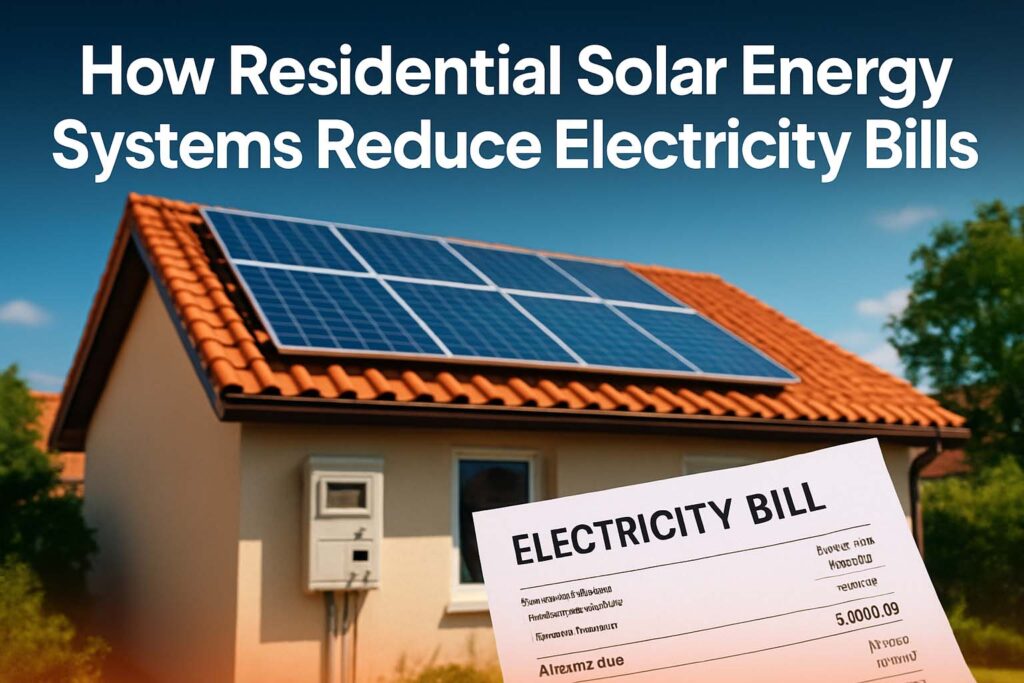How Residential Solar Energy Systems Reduce Electricity Bills
In today’s world, energy prices are rising faster than ever. Homeowners are constantly looking for ways to cut down on utility costs. One of the most effective methods is switching to solar. Residential solar energy systems reduce electricity bills significantly while also helping the environment. With proper planning and installation, solar power can turn a high electricity bill into a much smaller expense—or even eliminate it altogether.

Why Solar Energy Systems Reduce Electricity Bills
Solar panels harness the sun’s energy to power your home. Once installed, they generate free electricity during the day. This means you rely less on the grid and reduce your utility bills every month. When your system produces more electricity than you use, the excess can often be sent back to the grid for credit. This is called net metering, a key benefit of solar power systems.
The initial cost of solar installation may seem high. But when you calculate your monthly savings over 10 to 25 years, the total savings become clear. Homeowners can expect to save thousands of rupees or dollars depending on their system size and local energy costs.
How the System Works to Cut Costs
Let’s break down how solar energy cuts down electricity bills:
- Solar panels are mounted on your rooftop or backyard.
- These panels absorb sunlight and convert it into direct current (DC).
- An inverter changes DC into alternating current (AC), which powers your home appliances.
- Any extra electricity goes to the grid, earning you credits if your area supports net metering.
- At night or during cloudy days, you can use these credits or draw from the grid.
The key point: the more sunlight your system captures, the less power you draw from the utility company.
Financial Breakdown: Monthly Savings from Solar Systems
Let’s use a simple table to understand potential monthly savings.
| System Size (kW) | Avg. Monthly Generation (kWh) | Avg. Monthly Bill Without Solar | Avg. Bill With Solar | Monthly Savings |
|---|---|---|---|---|
| 3 kW | 360 | $120 (Rs 33,000) | $30 (Rs 8,000) | $90 (Rs 25,000) |
| 5 kW | 600 | $200 (Rs 55,000) | $50 (Rs 13,000) | $150 (Rs 42,000) |
| 10 kW | 1200 | $400 (Rs 110,000) | $100 (Rs 28,000) | $300 (Rs 82,000) |
Note: Actual savings depend on local electricity rates, sunlight exposure, and system efficiency.
Long-Term Benefits: How Solar Energy Systems Reduce Electricity Bills for Years
Solar panels have a lifespan of 25 to 30 years. During this time, they provide consistent energy production with minimal maintenance. You lock in a fixed cost for your energy, protecting yourself from future rate hikes.
In countries where energy prices are unstable, this is a major advantage. For instance, in places like Pakistan and India, grid electricity prices rise every year. By going solar, you create your own mini-power plant, stabilizing your expenses.
Net Metering and Its Role in Reducing Electricity Costs
Net metering allows you to send unused solar electricity back to the grid. You get credits for this extra power. When your system underproduces (at night or during cloudy days), these credits reduce your bill.
Not all locations support net metering, but where it is available, it increases the return on investment (ROI) for residential solar systems. Some countries have introduced time-of-use (TOU) rates, where electricity prices vary throughout the day. With the right battery setup, you can store solar power and use it during peak expensive hours.
Impact of Solar Panel Efficiency on Electricity Savings
The efficiency of your solar panels matters. Higher efficiency panels generate more electricity in the same amount of sunlight. This means:
- More savings on your bill
- Smaller space required for installation
- Faster payback period
Modern panels have efficiencies ranging from 17% to 23%. Choosing a reputable brand ensures better performance over time and better resistance to dust and temperature loss.
Battery Storage: Further Reducing Electricity Bills
Adding a solar battery system lets you store unused energy. This energy can be used at night or during a power outage. While batteries increase the upfront cost, they give you more control over your power usage and reduce your dependency on the grid.
Here’s how batteries impact savings:
| Without Battery | With Battery |
|---|---|
| Use grid power at night | Use stored solar energy |
| May have blackouts | Backup during power cuts |
| Limited net metering benefit | Maximize solar usage |
Some homeowners use hybrid systems that combine solar panels, batteries, and a grid connection. These systems ensure the highest level of energy independence.
Real-Life Example: How Solar Energy Systems Reduce Electricity Bills in Practice
A family in Lahore installed a 5kW solar system in 2022. Their average monthly bill dropped from Rs 40,000 to Rs 6,000. They paid off the system in under 4 years through energy savings alone. Over 25 years, they are projected to save more than Rs 5 million.
This real example highlights the value and performance of solar in regions with strong sunlight and rising electricity tariffs.
Cost Recovery and ROI of Residential Solar Energy Systems
Payback periods typically range from 3 to 7 years depending on:
- System size
- Local energy prices
- Government incentives
- Financing options (solar loans or leasing)
After the payback period, all generated electricity is essentially free. This makes solar a high-return investment, especially when paired with low-interest green financing.
Related anchor: Learn more about Loans for Solar Systems and their role in affordable clean energy access.
Environmental Benefits That Add to Economic Value
While the primary reason for going solar is to reduce electricity bills, solar energy systems also provide significant environmental benefits. They reduce:
- Greenhouse gas emissions
- Fossil fuel dependency
- Urban air pollution
This aligns with both national and global goals for carbon reduction. When homeowners adopt solar, they contribute to a cleaner, more sustainable future.
Related anchor: Discover how Solar Load Calculators help size your system for maximum savings and efficiency.
Government Policies That Help Solar Energy Systems Reduce Electricity Bills
Many governments offer:
- Tax credits
- Feed-in tariffs
- Subsidies or grants
- Zero customs duty on solar imports
These policies lower the upfront cost and increase adoption. For example, Pakistan’s net metering policy under NEPRA allows residential users to earn full credit for excess power fed back to the grid.
Always check the latest regulations and incentives in your country. They can improve ROI and shorten the payback period significantly.
Conclusion: Why Every Homeowner Should Consider Solar
Solar energy systems reduce electricity bills by generating your own power and reducing grid dependency. With net metering, batteries, and efficient panels, the savings are real and long-lasting. While the initial investment can be high, the long-term benefits—financial and environmental—make it worthwhile.
For any homeowner tired of rising utility costs, solar is a smart, future-proof solution. From reducing your monthly expenses to contributing to a cleaner planet, it’s a win-win.
Make the switch now, and enjoy the financial freedom that solar brings for the next 25 years or more.
Related anchor: Dive into the Top 10 Benefits of Installing Solar Energy Systems at Home and see how it transforms your life.
Follow Us on Social:
Subscribe our Newsletter on Electrical Insights for latest updates from Electrical Engineering Hub
#SolarEnergySystems, #ReduceElectricityBills, #ResidentialSolar, #SolarPowerSavings, #GreenEnergy, #SolarForHomes, #CutElectricCosts, #EnergyIndependence, #GoSolar, #HomeSolarSystem, #SaveWithSolar, #SolarEnergyBenefits, #SolarBillReduction, #CleanEnergy, #SustainableLiving


